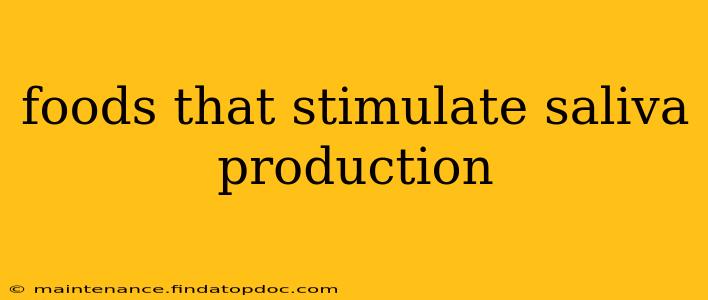Saliva, often overlooked, plays a crucial role in oral health, digestion, and overall well-being. A dry mouth, or xerostomia, can lead to discomfort, difficulty swallowing, and increased risk of cavities. Fortunately, many foods can naturally stimulate saliva production, offering a delicious and effective solution. This guide explores those foods and answers common questions surrounding saliva stimulation.
What Foods Increase Saliva Production?
Numerous foods can trigger your salivary glands to work overtime. The best ones often share characteristics like acidity, specific textures, and strong flavors. Let's delve into some of the top contenders:
High-Acid Foods: The acidity of certain foods acts as a natural stimulant for saliva. Your mouth works to neutralize the acid, resulting in increased saliva production.
- Citrus Fruits: Lemons, limes, oranges, and grapefruits are excellent examples. Their tartness triggers a significant saliva response.
- Tomatoes: These versatile fruits (botanically speaking!) offer a similar effect due to their acidity.
- Vinegar-based Foods: Pickles, salad dressings with vinegar, and even a splash of vinegar in water can stimulate saliva flow.
Foods with Strong Flavors: Intense tastes, whether sweet, sour, spicy, or savory, tend to elicit a salivary response. Your body is preparing to process the incoming flavors.
- Spicy Foods: Chili peppers, hot sauces, and other spicy dishes are known saliva producers. The capsaicin in chili peppers is a particularly potent stimulant.
- Sour Candies and Sweets: The intense sourness of many candies stimulates saliva, while the sweetness of others can also have a similar, albeit less pronounced, effect.
- Highly Seasoned Dishes: Foods with strong herbs and spices will often increase saliva production. Think bold curries, flavorful stews, or intensely seasoned meats.
Foods with Chewy Textures: The act of chewing itself stimulates saliva production. Foods requiring more chewing time naturally lead to increased saliva flow.
- Fruits and Vegetables: Apples, carrots, celery, and other crunchy produce require significant chewing, stimulating saliva release.
- Chewing Gum: Sugar-free chewing gum is a popular method for stimulating saliva, especially for individuals experiencing dry mouth. The act of chewing, even without food, activates the salivary glands.
- Nuts: Almonds, walnuts, and other nuts necessitate thorough chewing, leading to increased saliva.
Why Does My Mouth Feel Dry?
A dry mouth, or xerostomia, can stem from several factors. Understanding the underlying cause is critical for effective management.
- Dehydration: Insufficient water intake is a common cause. Your body needs adequate hydration to produce saliva.
- Medications: Many medications, especially those used to treat anxiety, depression, and high blood pressure, list dry mouth as a side effect.
- Medical Conditions: Certain medical conditions like diabetes, Sjögren's syndrome, and autoimmune diseases can affect saliva production.
- Smoking and Alcohol Consumption: Both smoking and excessive alcohol consumption can significantly reduce saliva production.
- Age: Saliva production naturally decreases with age.
What Are Some Home Remedies for Dry Mouth?
Beyond dietary changes, several home remedies can help alleviate dry mouth:
- Stay Hydrated: Drink plenty of water throughout the day.
- Avoid Tobacco and Excessive Alcohol: These substances severely impact saliva production.
- Use a Humidifier: Dry air exacerbates dry mouth. A humidifier can add moisture to the air.
- Avoid Caffeine: Caffeine has a diuretic effect, contributing to dehydration.
- Sugar-Free Gum or Candy: These can temporarily stimulate saliva flow.
Can Certain Drinks Help with Dry Mouth?
While water is paramount, some other beverages might offer some relief:
- Unsweetened Tea: Warm, unsweetened tea can soothe a dry mouth. Avoid caffeinated varieties.
- Herbal Teas: Certain herbal teas, like chamomile or peppermint, can offer additional benefits beyond hydration.
What Foods Should I Avoid if I Have Dry Mouth?
Foods that can worsen dry mouth symptoms are typically those that are dehydrating, overly acidic, or sticky.
- Sugary Drinks and Foods: Sugary drinks and foods can worsen dry mouth, promoting bacterial growth.
- Caffeinated Beverages: Caffeine's diuretic effect contributes to dehydration.
- Alcohol: Alcohol dehydrates the body.
- Salty Foods: Excessive salt can draw moisture from the body.
This information is for educational purposes only and does not constitute medical advice. Always consult with a healthcare professional if you experience persistent dry mouth or other oral health concerns. They can help determine the underlying cause and recommend appropriate treatment.
